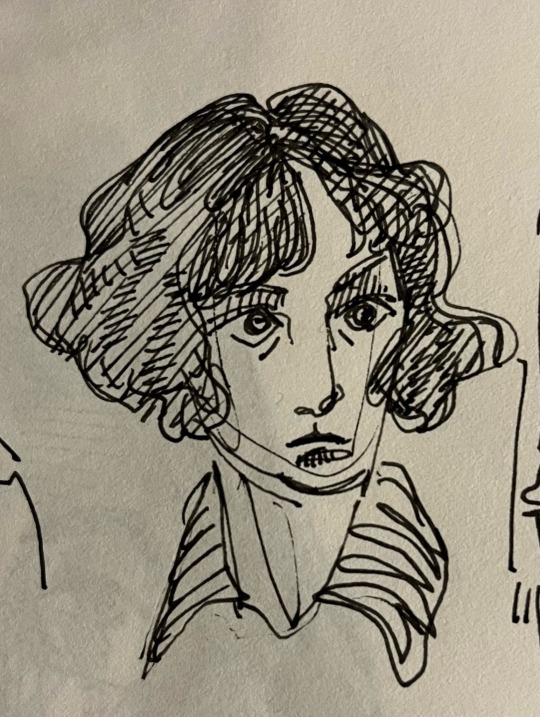#dorothy sayers
Text



Harriet Walter as Harriet Vane my beloved
#harriet vane#lord peter wimsey#I don’t know how to tag the adaptation this is from#because the title is super vague#but it’s the 1987 tv adaptation#these sketches are from when I watched the Have His Carcase episodes#so I guess#have his carcase#dorothy sayers
198 notes
·
View notes
Text
Dorothy Sayers in 1932: "Church clocks and bodies in belfries are rather overdone lately."
Dorothy Sayers in 1934: lol jk I have a new special interest so strap in
170 notes
·
View notes
Text
Lucian's Library 5
Feel free to suggest never written books you wish you could read.
#The Sandman#The Dreaming#Sam Vimes#Terry Pratchett#Discworld#Nikolai Gogol#Dead Souls#мёртвые души часть#Iain M. Banks#Fanfic#Rosemary Edghill#Barry Hughart#Stieg Larsson#JRR Tolkein#Sylvia Plath#Sappho#Dorothy Sayers#Andre Norton#Mercedes Lackey
118 notes
·
View notes
Text
Got a question about Lord Peter Wimsey
Please spread this because it's applicable to about five people and I would like to find all of them.
259 notes
·
View notes
Text
Peter, of course, was just as tiresome as he could be, and that is saying a good deal. [...] I was prepared to do everything in my power to see that the thing was done properly, if it had to be done at all. But my mother-in-law took it all out of my hands, though I am sure we were distinctly given to understand that the wedding would take place on the day I had suggested, that is, next Wednesday. But this, as you will see, was just one of Peter's monkey tricks. I feel the slight very much, particularly as we had gone out of our way to be civil to the girl, and had asked her to dinner.
Well! Last Monday evening, when we were down at Denver, we got a wire from Peter, which coolly said, "If you really want to see me married, try St. Cross Church, Oxford, to-morrow at two." I was furious—all that distance and my frock not ready, and, to make things worse, Gerald, who had asked sixteen people down for the shooting, laughed like an idiot, and said, "Good for Peter!" [...]
Presently the bride and bridegroom vanished, and we waited a long time for them, till my mother-in-law came down, all smiles, to announce that they had been gone half an hour, leaving no address.
helen's letter in busman's honeymoon
At her lying in town this last parliament, I found means to see her twice or thrice we both knew the obligations that lay upon us, and we adventured equally, and about three weeks before Christmas we married. And as at the doing, there were not used above five persons, of which I protest to you by my salvation, there was not one that had any dependence or relation to you, so in all the passage of it, did I forbear to use any such person, who by furthering of it might violate any trust or duty towards you. The reasons, why I did not foreacquaint you with it, (to deal with the same plainness that I have used) were these. I knew my present estate less then fit for her; I knew, (yet I knew not why) that I stood not right in your Opinion; I knew that to have given any intimation of it had been to impossibilitate the whole Matter. And then having those honest purposes in our hearts, and those fetters in our Consciences, me thinks we should be pardoned, if our fault be but this, that we did not by fore-revealing of it, consent to our hindrance and torment.
john donne's letter to sir george more on his marriage to ann more, february 2 1601/1602
42 notes
·
View notes
Text

Murder Must Advertise + Coffee
#Murder Must Advertise#Lord Peter Wimsey#Dorothy Sayers#book#bookcover#booklr#book photography#black coffee#coffee#photography
58 notes
·
View notes
Text
You've heard of Dorothy Sayers' poem Desdichado but have you read the Hades and Persephone-themed poem from that same collection because this thing goes way harder than anything should:
REX DOLORIS
* Signed with the sign of His Cross and salted with His salt. S. AUGUSTINE.
"WHEREFORE wilt thou linger, Lady Persephone?
The sheaves are gathered, the vintage is done,
Bacchus through the ivy leaves laughing with his satyrs
Calls us to the feasting, and the ripe, red sun
Drops like an apple, tumbling to the westward,
The shout of the Maenads is merry on the hill,
Why do the wheat-ears fall from thy fingers?
Whom does thou look for, lingering still?
"Whom dost thou look for? Here is one to woo thee,
Brown-cheeked, beautiful, lissom as the larch,
Lightsome, slender, blossomy with kisses,
Merrier-footed than the winds in March;
Loose thy hair to dream along his shoulder,
Drowse in thy whiteness warm upon his breast,
He shall feed thee with wheaten cakes and honey
And all fair fruits that are rich and daintiest."
"I weary of the feast, I weary of the harvesting,
I weary of your music, children of the earth--
Your feet dance over the roofs of my palaces,
The halls of Hades ring hollow to your mirth;
The great King of Grief hath reft me, ravished me,
Broken me with kisses, conquered me with pain,
I have drunk his bitter wine, I have eaten of His pomegranates,
Can find no savour in the honeycomb again."
"Wherefore wilt thou linger, Lady Persephone?
When sheaves are gathered and the vintage is done,
And Bacchus through the ivy leaves laughing with his satyrs
Calls us to the feasting, and the ripe, red sun
Drops like an apple, tumbling to the westward,
While the shout of the Maenads echoes from the hill?"
"Ere the round moon rise ruddy on the corn-shocks
The Lord of Hades shall have me at His will."
#poetry#Dorothy Sayers#poems and quotes#Poem#hades and persephone#hades x persephone#fun fact: it was this poem that helped me figure out the retelling I'd wanted to write FOREVER
82 notes
·
View notes
Text
"Her father was some queer sort of recluse--a mediaevalist, or something--desperately poor."
-Dorothy Sayers, "The Cyprian Cat"
#dorothy sayers#Dorothy! Dorothy#you did not need to call me out like that#medievalist#medievalists in literature#some queer sort of recluse#for the chrestomathy#i'm in this picture and i don't like it#oh who am kidding#i like it just fine
52 notes
·
View notes
Note
i'm reading all the peter wimsey novels because someone recommended gaudy night and that's how i work, and now i'm up to the nine tailors and just finished murder must advertise (my favorite so far), but i found it really hard to get through have his carcase, which was odd since i loved harriet vane so much in strong poison. even the characters seemed to bugger off at the end of have his carcase instead of tying up all the storylines and sayers seemed disengaged after the first act or two. i liked the parts with peter and harriet, even the two chapters that are 99% cipher, but everything else felt weak. did you enjoy this one/why or why not? do you have a favorite of the wimsey novels other than gaudy night?
I may be inducing a fight by saying this but I think Have His Carcase is one of Sayers' weakest novels, and certainly the weakest of those featuring Harriet Vane. I tried to re-read it recently and couldn't get very far into it, and I'm a huge fan of Sayers. I think it's also a necessary book in order to create a complete story for them -- but I don't know that it's necessary to read it in the modern era, and certainly not necessary to re-read it.
(My other picks for least enjoyable: Five Red Herrings and Nine Tailors, both of which are visibly her attempts to write like Agatha Christie, one of her literary heroes -- and they're not bad books, I just don't like Agatha Christie style "clockwork" mysteries, which tend to sacrifice personality to logistics. I suspect this may have impacted Carcase somewhat. We will come back to this.)
Gaudy Night is actually not my favorite overall -- I think it's one of her best, but Murder Must Advertise is my favorite and in fact the first one I read. Which is hilarious because Peter spends a significant amount of time Not Being Peter Wimsey in it, but it's just such a combination of things I love. Advertising (which Sayers worked in and which she also clearly loved writing about), secret identities, crime rings, a hint of romance, office gossip...
Anyway, Carcase. I think the problem is that to get from Strong Poison to Gaudy Night, there has to be a bridge, and it has to be kind of an unpleasant one, and thus you get Have His Carcase. One of the major points of Harriet's arc is that Sayers wanted to contravene the "damsel rescued by the hero" narrative. Not so much because she believed women should save themselves or not, but because she believed that a relationship based on that kind of inequality, where one partner was grateful (or was expected to be grateful eternally) for being saved, was inherently unhealthy and unsustainable, and it was also a super common narrative at the time she was writing. This reaction to the narrative is most visible in her unfinished novel Thrones, Dominations -- which was finished after her death by Jill Paton Walsh, and I'm not a huge fan of the end product, but I've seen the original manuscript held at Wheaton and it's evident that this was a theme before anyone else took over, it wasn't forced into the plot.
In any case, Sayers had to get Harriet and Peter from victim and rescuer to equal footing, and while Gaudy does a lot of lifting in that regard, it doesn't do enough on its own, there had to be a previous groundwork laid. In a sense I'm glad that the grappling they have to do, which is sensible and intelligently written but also really unromantic, was done in Have His Carcase, so that it doesn't intrude more than briefly into Gaudy Night. Carcase is a lot about Harriet setting boundaries and testing whether Peter will cross them, and Peter reacting (sometimes poorly) to someone challenging him in ways he's unaccustomed to being challenged. Carcase is two people finding out the worst parts of each other so they can work out that they love the reality of each other anyways, which is what they're doing in Gaudy. But we have to witness it in Carcase, which is unpleasant. At least for me.
As she matures as an author and gains more power over how she's published, you can see Sayers trying new things -- after Bellona (another fave) she gets very literary with Strong Poison, and then seems to swing between these kind of torturous attempts at Christie's style (Herrings, Tailors) and incredibly sensitive, emotionally delicate books like Murder Must Advertise and Gaudy Night. Carcase is a weird combination of the two, where she seems to be applying the dispassionate Christie style to a book that wants to be Gaudy Night but can't be.
Anyway, even her less enjoyable books can still be pretty fun, and it's worth it to have books like Murder Must Advertise and Strong Poison, and the thrilling romance of Gaudy Night. But yeah, Carcase is a bit of a slog to get through.
145 notes
·
View notes
Text
Truly, must one pay attention to "clues" and "suspects" to enjoy a mystery? Isn't it enough just to vibe with a clever bisexual?
#I'm back on my Peter Wimsey bullshit and I cannot keep the six suspects straight in this book#peter wimsey#lord peter wimsey#dorothy sayers#harriet vane#Miss marple#agatha christie#post o' mine#clearing out the drafts
74 notes
·
View notes
Text
I’m not a devotee of detective fiction, but as a dyed in the wool Anglophile, I found Gaudy Night’s setting at a women’s college at Oxford University very interesting. I have yet to visit Oxford, but the descriptions of place and personalities brought to mind my wife’s reminiscences of her undergraduate days at an all women’s college in New England. I was a bit fuzzy on the Oxford jargon until I found the helpful link below. The writing and the characters are smart, the setting is atmospheric, and of course Lord Peter Wimsey (who features most prominently in the latter third of the book) is a delight.
Excerpts:
As one grew older, as one established one’s self, one gained a new delight in formality.

20 notes
·
View notes
Quote
The black frock fitted her like a glove. It was made with the small square yoke and long, close sleeves, softened by a wrist-frill falling nearly to the knuckles. It outlined her figure to the waist and fell full- skirted to the ground, with a suggestion of the medieval robe. Its dull surface effaced itself not outshining the dull gleam of the academic poplin.
Yes, I want this dress, an urge I often feel when reading of fashion in fiction.
This one was described in 1936 by Dorothy L. Sayers in her novel Gaudy Night, a book in which Sayers made clear that she believed a woman of sense knew how to dress appropriately for every occasion. The occasion here was Gaudy Night when the alums of the women’s college set at Oxford University in England came back for a celebration. Her heroine, Harriet Vane, herself a writer of mysteries wears the dress. The dress is not only quietly magnificent, Vane also knows just how to wear it with the academic robe, the “academic poplin” mentioned, which she must wear over the dress, a tradition of the college.
Vane has come back as an alum and ends up trying to solve two mysteries: who is harassing the women of the college with threats and vandalism? and should she marry Lord Peter Wimsey, the impossibly charming, erudite and wealthy investigator who save her from a murder conviction? The answer to the second question seems obvious to me--yes, go marry the man!-- but Sayers takes just as long to explore the question of marriage for a woman with a professional career in 1936 as she does to uncover the mystery.
#Dorothy Sayers#harriet vane#lord peter wimsey#fashion in fiction#gaudy night#vintage evening dress#vintage fashion#1930s fashion#costume history#dress history#fashion history#academic fashion#oxford university#mystery novels#marriage
210 notes
·
View notes
Text
Sayers Hivemind: Does anyone have an answer to the Mystery of Peter's Niece? I haven't read much of Sayers' letters or her writing about the books; does she ever explain this strange child?
There are only two extremely brief mentions of this character to my knowledge: in Gaudy Night, when Saint-George says "my sister" is "at school," and in Busman's Honeymoon, when Peter says "[Saint-George's] sister" has "no vitality." If she was mentioned only in an early story, I'd assume Sayers had changed her mind about including the character and hoped people would forget, but having her only mentioned in the last two books is really strange.
Based on an absence of evidence, she had to have been born after Clouds of Witness, since Peter says that Gerald's death would affect "his wife and young son" -- you'd expect him to say "his wife and children" if he had more than one.
She's also not mentioned in “The Learned Adventure of the Dragon's Head,” which takes place when Jerry is 10, and although it's technically possible she could have been alive at this point, it seems unlikely -- Peter is taking care of Jerry because Gerald and Helen are on vacation and there's an illness at his (Jerry's) school. If Gerald and Helen had left the baby with a nurse at Duke's Denver, Jerry could have gone back there, and it seems unlikely that they would have brought a child of less than two on vacation with them.
In Gaudy Night, Jerry's age is not explicitly stated, but Peter says "you attain your majority next July," and as far as I can tell that meant turning 21 at the time. If Jerry is 20 in Gaudy Night and The Sister was born right after "Dragon's Head," she'd be about 10 -- my understanding is that boarding schools at the time didn't start students until 11 or 12. Also, Jerry says that he doesn't think it would occur to her to write to Peter about Jerry's injury: "'Not unless Aunt Mary's written to him. My Grandmother's on the Riviera, and I don't suppose it would occur to my sister. She's at school." This implies that her being at school is the reason he wouldn't expect her to write; i.e., she's busy. But if she's 10 or so, you'd think he'd say something like "I don't suppose it would occur to my sister, she's just a kid." When I was a preteen, it certainly never occurred to me that it would be my job to update any adult about our family news.
Basically none of it seems to add up, and I'm absolutely flummoxed. If any of you know something I don't which explains, or at least makes more understandable, this baffling mystery, I would be greatly obliged.
42 notes
·
View notes
Text
I find it hilarious that I first learned about sweet omelets from a mystery novel¹ where the murderer used one to poison someone. Like, they're delicious but seem to have dropped out of the US culinary repertoire, and here's how to kill someone with one. ¯_(ツ)_/¯
Annnnyyywaaayyyyy....
This morning I made an omelet with apricot jam and apricot-mango yogurt. Normally I would use sour cream instead of yogurt, but the sour cream was looking...hey, I wasn't trying to poison anyone, so the yogurt seemed safer. It was lovely and seemed appropriate to Easter and/or a sunny morning in springtime.
(And my mother, whose appetite has been suffering, ate all of her omelet, half a deli slice of ham, and the leftover apricot-mango yogurt! This is more calories than I've gotten into her in a single meal in weeks.)
The recipe is basically "Make an omelet, but replace the savory spices in the egg mixture with vanilla extract and a bit of sugar. Top with dollops of yogurt/sour cream and apricot jam. Fold over and serve.". The Frugal Gourmet is where I learned to make omelets.
youtube
¹ Dorothy Sayers, Strong Poison
7 notes
·
View notes
Text

Currently reading Murder Must Advertise by Dorothy Sayers
#Murder Must Advertise#Dorothy Sayers#Lord Peter Wimsey#read#reading#booklr#book#bookcover#book photography#photography#read in 2023
49 notes
·
View notes
Text

Seven Covers in Seven Days: Day 1
My seven days will certainly not be consecutive, but for now, I thought I'd start with my battered, hand-me-down copy of Gaudy Night by Dorothy Sayers!
tagged by @beardedbookdragon
tagging...who hasn't done this yet? feel free to let me know if you're interested in a future tag! for now, will tag @wearethekat (in a usual, non-obligatory way)
(Every day, post the cover of a book you love and tag someone else to do the same.)
#seven covers in seven days#eb's photos#id in alt text#gaudy night#dorothy sayers#peter wimsey#and of course#harriet vane#this copy was once my mother's - but she also had another (better) copy so gave this one to me!#then I read the cover off
25 notes
·
View notes